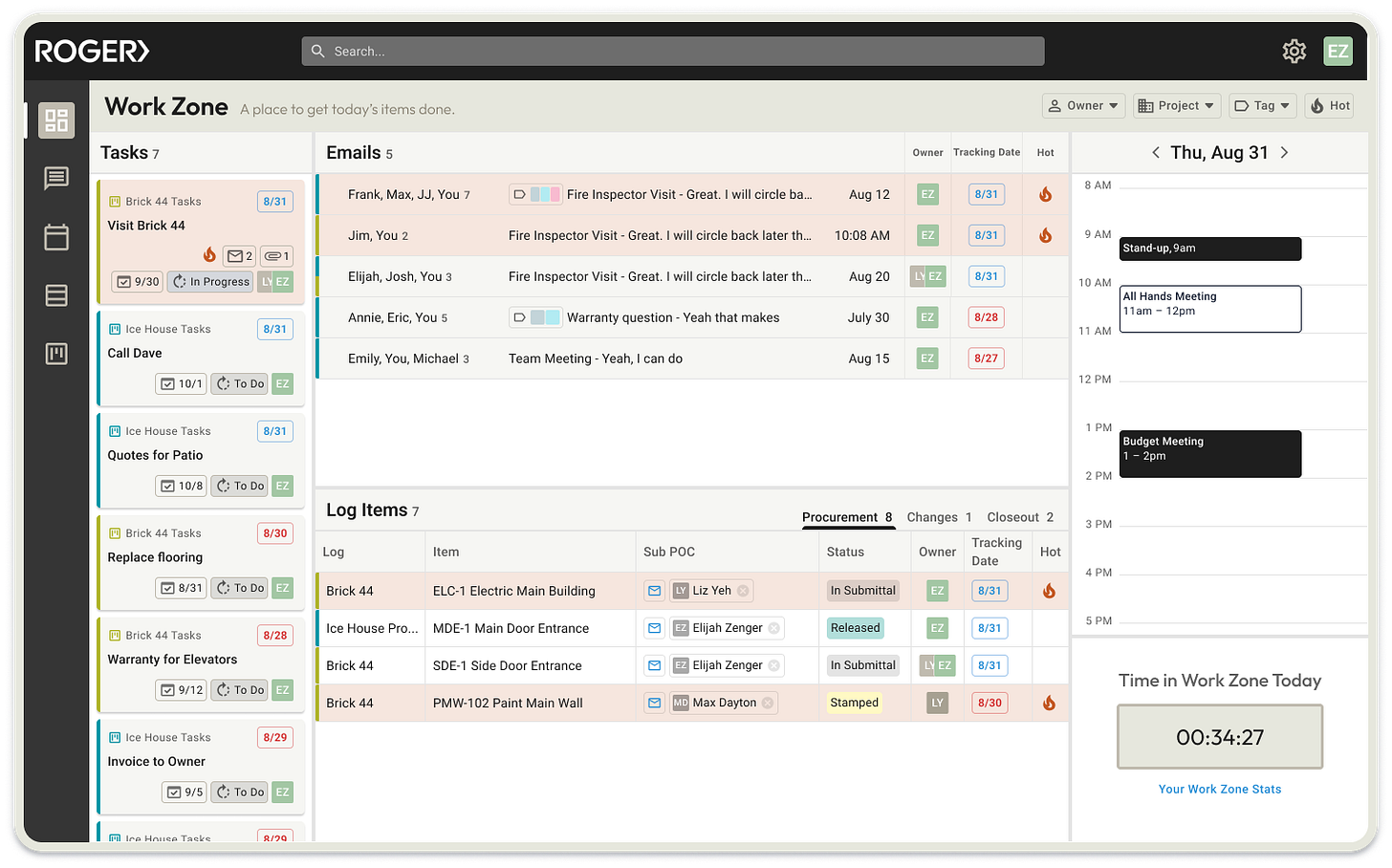👋 Hey, Kyle here! Welcome to The Influential Project Manager, a weekly newsletter covering the essentials of successful project leadership.
Today’s Overview:
Project Managers are the backbones of the construction world. Through a blend of collaborative leadership, problem-solving, and clear communication, they guide teams to meet project milestones. But what does a project managers day-to-day actually look like?
This week’s article provides an hour-by-hour breakdown of a day in the life of "Alex", a hypothetical project manager overseeing the construction of a medical office building. Alex's day begins at 5:00 am and covers a range of activities including planning, morning huddles, client meetings, deep work sessions, email management, site walks, and wrap-up sessions.
The importance of clear and timely communication, whether through emails, calls, or meetings, is highlighted as a key characteristic of successful project management.
Today’s Newsletter is Brought to You by Roger - the fastest growing workflow tool that is making Construction Managers excellent!
Who is Roger built for? Managers who are overwhelmed with email, are struggling to track tasks, or constantly chasing trade partners or clients.
What does Roger do? Roger is only platform built to help construction managers do tedious, day-to-day work faster: tracking tasks, sending emails, monitoring procurement, uploading documents to Procore, and more. We empower teams to prioritize and excel.
The Impact? We work with clients of every size — from large GC’s to small MEP trades. Managers are 2x better at follow-up, spend 25% less time managing email, and drop 20% fewer tasks. We make your team great at the basics, so they can prevent fires, rather than fight them.
Exclusive for iPM subscribers: Priority access to our waitlist. Hurry, spots are limited!
A Day in the Life of an Influential Project Manager
Filed under: Project Management
Much of what you find online related to project management is theoretical. Examples feel like they’re straight out of a textbook, lacking real-world context and reliability.
While I try to provide as much context and as many examples as possible, I felt the need to create something a bit more relatable for our readers.
Everyone, in one way or another, can connect with construction - whether through witnessing the rise of grand infrastructures or experiencing a personal home-building journey.
This very familiarity sparks a common question: "What exactly do project managers do?"
Project managers are the backbones of the construction world. Through a blend of collaborative leadership, problem-solving, and clear communication, they guide teams to meet project milestones.
Their role involves in-depth planning, coordination, and oversight from a project's beginning to its end. These professionals not only guide the safe and timely completion of projects but also guarantee adherence to quality standards and client expectations. Their proactive approach helps foresee potential challenges, ensuring seamless operations on the ground.
So, what does a typical day for an effective project manager look like? Read on as we explore the details of their day-to-day responsibilities.
A Day In The Life Breakdown, Hour By Hour
For a project manager, each day is different. Every project manager has a different routine developed on the basis of their preference pertaining to the project they are handling, the rate of progress as well as the deadlines.
To give this example some context, we’re imagining that the medical office building above is in the midst of construction. Say, 25% complete. Although the project is in full-swing, there’s much work left to be done.
Meet "Alex," our hypothetical construction project manager for this narrative.
Organized, disciplined, and a skilled team leader, let’s dive into a day in Alex’s shoes to see how he efficiently navigates his day.
5:00 am - Rise & Shine
The sun hasn't even peeked over the horizon, but our Project Manager, Alex, is already up and ready to tackle the day.
The night prior, Alex had already set out his outfit, packed his gym bag, and prepared his meals for the day.
This preparation makes getting out the door friction-less, eliminating any extra thought or energy. It sets the tone for a productive day ahead.
6:00 am - Morning Review & Planning
Alex arrives at the project’s job site office trailer. With a steaming cup of coffee in hand, Alex reviews the day's to-do list and gets himself grounded. It's extensive, but with the right tools, mindset, and behaviors, nothing is unachievable.
From the night before, he knows his top three tasks for the day. He also skims yesterday's emails to make sure nothing's missed.
Using his task tracking system, Alex gets an overview of his day – the schedule, important tasks, upcoming meetings, and any urgent issues. This helps him set clear goals for the day and be ready for any discussions or meetings later on.
6:30 am - The Morning Huddle
In line with the Last Planner System, Alex and the broader project team gather for their daily morning huddle. During the huddle, each trade leaders provide their answers the following 6 questions:
What are you working on?
Where are you working?
How many crews/workers are on-site?
What are your constraints/needs?
What material deliveries are coming up?
Are there any safety concerns?
Alex listens in and supports his superintendents on any items that may require his insight or assistance.
The project team leaves motivated and energized to have a successful day because of the clear direction and open communication.
7:00 am - Deep Work
Georgetown professor Cal Newport says that deep work is analytical thinking that requires the most concentration —researching, reading, writing, analyzing, or problem-solving.
Alex uses the quiet early hours for "deep work" – his tasks that need undivided attention.
Be it a challenging email to a trade partner or client, drafting a subcontract agreement, or writing a schedule narrative, this is his window to address significant tasks head-on.
8:00 am - Make Critical Phone Calls & Follow Ups
Once Alex has a firm grasp on his to-do list and tackles his most challenging task – often referred to as "eating the frog" – he dives into the rest of his responsibilities.
Given the urgency often associated with critical information and pressing deadlines, Alex prioritizes items that are overdue or unresolved. This could mean confirming an upcoming meeting, seeking essential details, or reminding someone about a late task.
Being a project manager involves constant communication. Alex frequently checks his phone and computer, ensuring he's accessible for calls, emails, and texts.
9:00 am - Client Meeting
Alex meets with clients to discuss project progress. The client meeting consists of the Construction Manager and Design Team providing a status update. They typically address:
Current adherence to the planned schedule
Updates on project advancements and any potential delays
Outstanding submittals, RFIs, and necessary information
Ideas for accelerating the project schedule
Forthcoming and unresolved change orders
The client's primary concern is the effective use of their investment. Ensuring the project stays on track in terms of schedule, budget, and quality is crucial. These meetings are to provide the Owner with transparency – the project’s status must be communicated and the opportunity given to ask questions.
Both the client and architect value Alex highly. His dependable reputation stems from his clear communication, accountability, and problem-solving approach.
10:00 am - Review Submittals, Procurement, & Documents For Approval
During his morning email check, Alex identifies several containing critical documents.
Together with his team, comprising project engineers and assistant project managers, they dive into these essential documents, discussing potential concerns. They evaluate materials like shop drawings or product data sheets, ensuring they fit the project's blueprint and schedule.
For instance, an onsite contractor has re-forwarded a set of shop drawings awaiting final approval. These particular drawings detail concrete work scheduled to commence by month's end. After the PM's review, these drawings are then sent to the Owner's engineer for the final approval.
Submittals like these are key to the schedule and overall flow of the project – they must be handled quickly. It's crucial to record specific details linked to these documents, such as submission and approval dates. To maintain the submittal log's accuracy, the PM ensures a Project Engineer is copied on related emails so they track it.
11:00 am - Make Calls, Forward Emails Along & Write New Ones
Construction project managers are most responsible for the management and administration surrounding the work onsite – not so much directly managing the work taking place.
Alex's next hour is a whirlwind of communication. He initiates calls to set tasks in motion, sends emails for pending items, specifies requirements for contractors or vendors, schedules meetings, and distributes meeting agendas and minutes.
His ability to delegate effectively shines here, as he assigns tasks and responsibilities to ensure seamless progress.
12:00 pm - Lunch Break
Alex takes a short break for lunch. Regardless of how hectic things get, he understands the necessity of fueling the body and resting the mind for long term success. When we don’t take care of ourselves, we burn out!
Although a fast meal might be the choice on some days, Alex often prioritizes sharing meals with his team. This shared moment, filled with laughter and informal chats, builds team unity and deepens their bond.
1:00 pm - Monitor Incoming Emails – Prioritize, Reply, Etc.
Emails play a huge role in construction management, encompassing everything from issuing documents and clarifications to scheduling upcoming meetings.
Given the flood of messages and activity, Alex dedicates time here to sorts and prioritize these communications to make for a successful afternoon. While certain emails demand immediate attention due to their time-sensitive nature, others are categorized for action at a later time.
Effective organization and task prioritization are cornerstones of a successful construction project manager.
That’s one key benefit of employing technology to transform your email into a robust workflow tool.
2:00 pm - Online Design Discussion with Specialty Subcontractors
Leveraging tools like Zoom or Teams, Alex holds virtual meetings with various stakeholders from different locales.
For complex projects like this one, the preliminary phase is crucial. Custom components require extensive upfront design work before they can move to exclusive fabrication.
During these meetings, the fabricator's design team typically raises questions, shares concerns, proposes solutions for specific onsite challenges, and seeks additional information.
Concurrently, Alex addresses topics such as scheduling, deadlines, payments, and other managerial details.
3:00 pm - Site Walk
At this hour, Alex takes a stroll around the project site. This not only allows him to directly assess the current state of progress but also offers an opportunity to engage with the team members working on-site.
Such walks serve a dual purpose: to verify the advancements discussed in earlier meetings and to cross-check the work done against the billed amounts.
It's a proactive approach that ensures everyone is on the same page and any discrepancies are addressed promptly.
4:00 pm - Day’s Wrap-Up
In the past couple of hours, emails have continued to trickle in. Alex continues to review what’s important, takes action if necessary, add items to his to-do list and reply when need be.
This includes more documents being forwarded along to contractors as they’re returned approved or rejected, particularly items that are tied to the schedule.
As the day winds down, Alex addresses any lingering issues, ensuring that all communication lines are clear and open for the next day.
With an eye on the tasks for tomorrow, he identifies top priorities and delegates tasks as needed.
5:00 pm - Fitness Time
After a busy workday, Alex makes sure to fit in some exercise. He knows it's good for his body and helps clear his head.
This workout helps him switch off from work and get ready for home time. It's his way of keeping balanced and feeling good.
6:00 pm - Family Time
After a day's work, Alex heads home, looking forward to some downtime.
Whether it's playing with his kids, chatting with family members, diving into a favorite hobby, or simply kicking back and relaxing, he knows how important it is to switch off from work and soak in these moments.
9:00 pm - Gearing Up for Tomorrow
As the day comes to a close, Alex quickly checks his emails and prepares for the next day. He lays out his clothes, packs his bags, preps his meals, and lists the main tasks for tomorrow.
It's his way of making sure he's ready to hit the ground running when the new day arrives.
9:30 pm - Lights Out
With the satisfaction of a day well-spent, Alex tucks in for the night. He drifts into a deep sleep, re-energizing himself for whatever tomorrow brings.
Key Insights & Takeaways
At the core of every project manager's day, one theme remains constant: communication.
As we've observed, emails play a pivotal role in construction management. With platforms like Roger, the day-to-day becomes less about firefighting and more about proactive management.
Clear, timely communication - be it through emails, calls, or meetings - is what sets apart successful project management.
Considering the sheer volume of communication in this industry, an effective workflow tool isn't just beneficial – it's essential. Such tools ensure that processes are streamlined, stakeholders stay informed, and responses remain timely.
Feeling swamped with endless emails or constantly chasing dates and subcontractors? Let Roger elevate your management game.
Be smart. Be proactive. Be like Alex. Choose Roger.
Until next week,
Kyle Nitchen

Before you go, here’s how I can help:
Upgrade your PM software. Project financials, management, and construction admin. Switch to INGENIOUS.BUILD to evolve from an administrative project manager to strategic project leader.
Get my full toolbox (free). It contains 30+ software and hardware tools I’m using today.
Hold your schedule accountable. Gain stability and flow in your projects with this Takt Planning & Control online course. Use code “Influentialpmtakt” for 30% off!
Advertise in this newsletter. Put your brand in front of 2,500+ construction project managers, leaders, and execs. (Booked out 5 weeks)
Support this Newsletter. The Influential Project Manager articles will remain free, but if you find this work valuable, I encourage you to become a paid subscriber. As a paid subscriber, you’ll help support this work.






Really enjoyed this article. One thing I would add to purpose of the 3pm Site Walk is this: it shows the work crews that you're engaged, care about their work, and not just an "office pencil pusher." I've found that this helps with morale and trust with the teams.
An 11 hour work day with 2 hrs for "Family Time" is a recipe for divorce, estranged kids and "Happy clients"
Work / life balance is a myth. There is life..Health is #1, then family...then the rest.